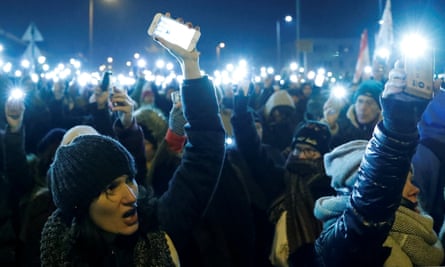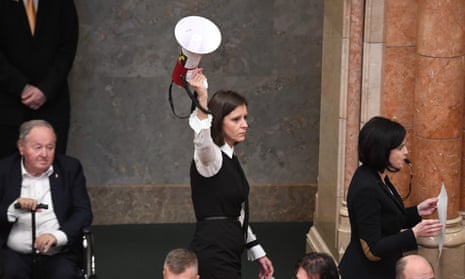When the speakers took the stage to address the crowds of protesters in front of Budapest’s imposing parliament building on Sunday, they had two things in common. They were all staunch opponents of Viktor Orbán, Hungary’s far-right prime minister. And they were all women.
In a country where Orbán’s populist politics have a distinctly macho flavour, and debates about women often come in the context of child-bearing and family life, the political opposition is being voiced in a united and distinctly female front.
“We wanted to send a message that female parliamentarians, and women in Hungary, should be heard,” said Ágnes Vadai, an MP from the Democratic Coalition, who said it was a conscious decision from opposition parties to send female MPs to speak to the crowd.
Hungary’s protests were sparked by a so-called “slave law”, passed by the Hungarian parliament last week, which allows employers to demand more overtime from their workers and delay payments for up to three years. A showdown in parliament, in which female MPs blocked the speaker podium and blew whistles in protest at the law, was followed by a series of street demonstrations.
Several thousands protests marched to Hungarian state television headquarters following the women leaders’ speeches on Sunday. A group of MPs camped out inside, unsuccessfully attempting to get a list of demands read on air. Several parliamentarians were roughed up by security guards and tossed back on to the street during the vigil. “I had a feeling they wouldn’t touch a woman. They did,” said Bernadett Szél, an independent MP who was ejected from the building.

Szél said that a group of female MPs is now in regular strategy discussions and would keep the pressure up, beginning with the next protest scheduled for Friday night. “We are in communication, and you are going to feel this ‘women power’ a lot in the future too,” she said.
Studies show that many rightwing populists use misogynist language and often demand women conform to traditional gender roles, and the situation in Hungary is particularly pronounced.
Andrea Petö, a professor in the department of gender studies at Budapest’s Central European University, said female representation in politics is worse in Hungary than neighbouring countries in central Europe. “While others have progressed, Hungary has stayed in the same place or even got worse since 1990,” she said, adding that the country has ranked among the worst in a list of 28 EU nations when it comes to gender equality.
Orbán’s Fidesz party and its coalition partners the Christian Democrats have 133 MPs between them, of whom just 11 are women.
Orbán’s rhetoric on women has frequently been dismissive and insulting, and usually focuses on their role as child-bearers and home-makers. Asked in 2015 why there were no women in his cabinet, he replied that few women could deal with the stress of politics. Last year, when asked about the surprise withdrawal of his ambassador to the US, Réka Szemerkényi, Orbán dismissed the question, saying he does not comment on “women’s issues”. His government earlier this year effectively banned the teaching of gender studies in Hungary.
“Viktor Orbán is afraid of women. He can’t speak to women normally. He has a complex around women,” said Andrea Varga-Damm, an MP from Jobbik, an extreme-right party that has tried to rebrand itself as centrist in recent years.
One of the defining features of the protest has been the united front shown by the opposition, with the fractured liberal opposition joining together and even sharing a stage with Jobbik, previously deemed unthinkable due to the party’s racist rhetoric.
Many observers say the overwhelming victory for Fidesz in April’s parliamentary elections was as much about opposition failures as it was about Orbán’s advantages, such as the almost total control he exerts over the media. Now, female politicians want to overcome those divides, at least for a while.
With a number of big male egos out of the way, as several parties changed leadership after the electoral defeat, a discussion to create a temporary united front is underway.
“There are a lot of political differences but there have also been personal differences between politicians,” said Vadai. “But the women participating on Sunday don’t have any personal differences. This is not a girl’s revolution, we need the men too, but the women are helping the process go more smoothly.”
Klára Nagy, a third-year sociology student at Budapest’s Eötvös Loránd university, was another of the speakers at Sunday’s protest, where she called for a general strike to protest against the law.
Nagy, a member of a new student union set up to protest Hungarian government policy in education, said the new wave of protests over the “slave law” could attract new faces to their movement.

“There were a lot of protests about academic freedom or democracy and this didn’t really connect with many people outside the intellectual Budapest bubble, but this issue affects everyone, and I hope it broadens the protest,” she said, adding that it was inspiring to see so many women at the forefront of the protests.
“Fidesz is a very macho party in style and in how they think about the family and the world,” said Zsuzsanna Szelényi, who was a Fidesz MP along with Orbán in the early 1990s before leaving for a career in European politics. Szelényi, who returned to Hungarian politics as a liberal MP, serving from 2014 to earlier this year, said the opposition to Fidesz is not perfect either.
She said her previous suggestions to focus on female empowerment in Together, a small liberal party she was part of, were ignored. “I suggested to my liberal colleagues that we made a political narrative that we were partners with women, and they were convinced it wouldn’t work.”
However, the protests of the past week appear to mark a new era in Hungarian politics. Márta Nagy, a 27-year-old psychologist who has attended several of the protests, said: “I don’t have much confidence in any Hungarian politicians to be honest, but it’s at least refreshing to see more women involved.”
Protest leaders, too, believe that is a message that is resonating. “Women will never keep quiet again,” Szél told the protest on Sunday. “Look at the women carrying these placards and look at Viktor Orbán’s government, then choose which one you want.”
